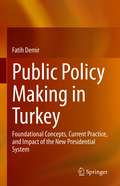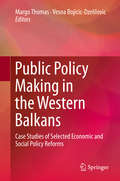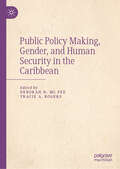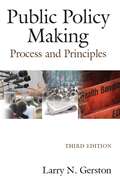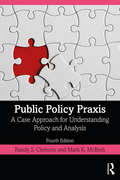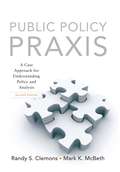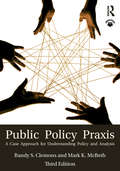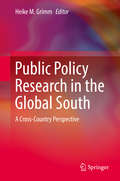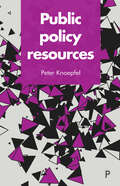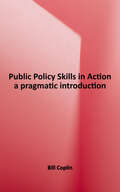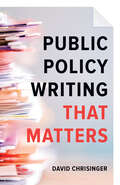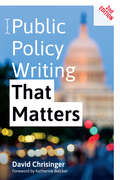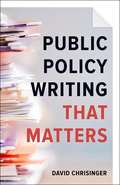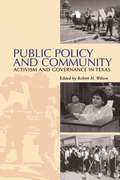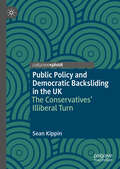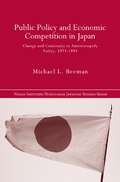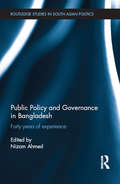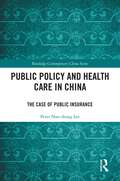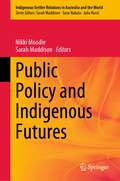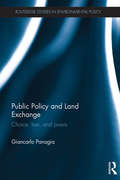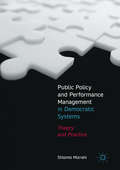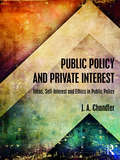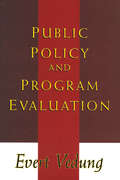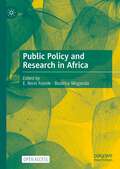- Table View
- List View
Public Policy Making in Turkey: Foundational Concepts, Current Practice, and Impact of the New Presidential System
by Fatih DemirThis volume discusses public policy making in Turkey. Using Turkey as an overarching case study, the author presents foundational concepts of public policy analysis. The method followed in the book is from general to specific: in each chapter, the relevant public policy stage or concept is explained and discussions from international literature are provided first. Then, Turkish cases are presented and clarified using theoretical concepts and debates. Additional examples from other municipalities are included for a comparative perspective. This volume will be of use to researchers and students studying public policy, policy analysis, and global public administration as well as professionals, policymakers, and diplomats working in the Turkish public sector.
Public Policy Making in the Western Balkans
by Margo Thomas Vesna Bojicic-DzelilovicDeveloping and 'transition' economies face myriad challenges in their attempts to achieve and maintain political stability and foster the economic growth essential for national security, the social well-being of current citizens and sustainable environments for future generations. Governments in the Western Balkans have striven to achieve all of the above, and this volume assesses the nature of their experiences as well as the level of their success in doing so. Featuring detailed case studies of public policy reforms in the region as well as comparative analysis on a range of indicators, the book analyzes the role of key players in setting the political agenda as well as implementing policy reforms. It also distils the lessons that can be learned from the Western Balkan experience, recommending strategies for enhancing the policy making process. In addition, it examines the developmental role played by the full spectrum of policy actors, including the private sector, NGOs, special interest groupings, international financial institutions, donor nations and the EU. Each case study has been prepared by academics with deep knowledge and experience of the western Balkans and addresses a core set of questions: identifying the policy issue and its broader context, defining the roles of specific individuals in formulating policy and reform and assessing the influence of networks and coalitions in the policy making process. With so little detailed literature on public policy making in a group of nations strategically positioned between Europe, Russia and the near East, the detailed insights provided by this volume will be widely welcomed. Our book provides case studies of specific public policy reform episodes in selected Western Balkan post-conflict and transition countries. The focus of these case studies extends beyond the technical aspects and entails substantive examination of the policy actors, constituencies and politics that ultimately shape the policy that emerges from the policy making process. This analysis draws lessons for strengthening the quality of policies, the transparency, consistency, and governance of the policy making process and ultimately for contributing to economic and social development of the region.
Public Policy Making, Gender, and Human Security in the Caribbean
by Deborah N. Mc Fee Tracie A. RogersThis edited collection brings together the work of practitioners, civil society actors, and academics, either located in the Caribbean, or involved in Caribbean-based work on public policy making and its implementation. The compendium challenges traditional dichotomies of external versus internal actors in the policy process, thereby, framing Caribbean public policy as a complex multi stakeholder undertaking. The collection is informed by three broad thematic areas: Gender and Policymaking, Human Security and Social Policy. Sub-themes include Gun Violence and CARICOM Small Island Developing States and the People Face/ Social Cost of Climate Change. This volume is ideal for researchers, policy-makers, academics, and graduate students.
Public Policy Making: Process and Principles
by Larry N. GerstonThis brief text identifies the issues, resources, actors, and institutions involved in public policy making and traces the dynamics of the policymaking process, including the triggering of issue awareness, the emergence of an issue on the public agenda, the formation of a policy commitment, and the implementation process that translates policy into practice. Throughout the text, which has been revised and updated, Gerston brings his analysis to life with abundant examples from the most recent and emblematic cases of public policy making. At the same time, with well-chosen references, he places policy analysis in the context of political science and deftly orients readers to the classics of public policy studies. Each chapter ends with discussion questions and suggestions for further reading.
Public Policy Praxis: A Case Approach for Understanding Policy and Analysis
by Randy S. Clemons Mark K McBethPublic administration and policy analysis education have long emphasized tidiness, stages, and rationality, but practitioners frequently must deal with a world where objectivity is buffeted by, repressed by, and sometimes defeated by value conflict. Politics and policy are "messy" and power explains much more about the policy process than does rationality. Public Policy Praxis, now in a thoroughly revised fourth edition, uniquely equips students to better grapple with ambiguity and complexity. By emphasizing mixed methodologies, the reader is encouraged, through the use of a wide variety of policy cases, to develop a workable and practical model of applied policy analysis. Students are given the opportunity to try out these globally applicable analytical models and tools in varied case settings (e.g., county, city, federal, international, plus urban and rural) while facing wide-ranging topics (starving farmers and the red panda in Nepal, e-cigarettes, GMOs, the gig economy, and opioid abuse) that capture the diversity and reality of public policy analysis and the intergovernmental and complex nature of politics. The fourth edition expands upon its thorough exploration of specific tools of policy analysis, such as stakeholder mapping, content analysis, group facilitation, narrative analysis, cost-benefit analysis, futuring, and survey analysis. Along with teaching "how to," the authors discuss the limitations, the practical political problems, and the ethical problems associated with different techniques and methodologies. Many new cases have been added, along with clear instructions on how to do congressional research and a Google Trends analysis. An expanded online Teaching Appendix is included for adopters, offering original cases, answers to problems, alternative approaches to case use, teaching exercises, student assignments, pedagogical ideas, and supplemental material directly tied to concepts covered in the text. With an easily accessible and conversational writing style, Public Policy Praxis is an ideal textbook for undergraduate and graduate courses in public policy analysis, community planning, leadership, social welfare policy, educational policy, family policy, and special seminars.
Public Policy Praxis: A Case Approach for Understanding Policy and Analysis
by Mark K Mcbeth Randy S. ClemonsPublic administration and policy analysis education has long emphasized tidiness, stages, and rationality, but practitioners frequently must deal with a world where objectivity is buffeted by, repressed by, and sometimes defeated by, value conflict. Too often public administration education has failed individuals who must deal with the hustle and bustle and complexity of policymaking. Public Policy Praxis equips students to grapple with ambiguity and complexity. By emphasizing mixed methodologies and through the use of cases, students are encouraged to develop a workable and practical model of applied policy analysis. Throughout the book, Clemons and McBeth argue that pragmatism demands that analysts learn to think politically and to understand that public problems are socially constructed. As such, in addition to analytical models, the authors examine specific tools of policy analysis, such as stakeholder mapping, content analysis, group facilitation, narrative analysis, cost-benefit analysis, futuring, and survey analysis. Students are given the opportunity to try out these analytical models and tools in varied case settings (county, city, federal, urban, and rural) facing wide-ranging topics (economic development, expansion of human services in an urban area, building a health care clinic in a small town, an inner-city drug program, and the bison controversy in Yellowstone National Park) that capture the diversity of public policy and the intergovernmental nature of politics. With chapters written to the student and in a nearly conversational style, Public Policy Praxis is an ideal textbook for undergraduate and graduate courses in public policy analysis, community planning, leadership, social welfare policy, educational policy, family policy, and special seminars.
Public Policy Praxis: A Case Approach for Understanding Policy and Analysis
by Randy Clemons Mark McBeth<p>Public administration and policy analysis education has long emphasized tidiness, stages, and rationality, but practitioners frequently must deal with a world where objectivity is buffeted by, repressed by, and sometimes defeated by, value conflict. Too often public administration education has failed individuals who must deal with the hustle and bustle and complexity of policymaking. Public Policy Praxis equips students to grapple with ambiguity and complexity. By emphasizing mixed methodologies and through the use of cases, students are encouraged to develop a workable and practical model of applied policy analysis. <p>Throughout the book, Clemons and McBeth argue that pragmatism demands that analysts learn to think politically and to understand that public problems are socially constructed. As such, in addition to analytical models, the authors examine specific tools of policy analysis, such as stakeholder mapping, content analysis, group facilitation, narrative analysis, cost-benefit analysis, futuring, and survey analysis. Students are given the opportunity to try out these analytical models and tools in varied case settings (county, city, federal, urban, and rural) facing wide-ranging topics (economic development, expansion of human services in an urban area, building a health care clinic in a small town, an inner-city drug program, and the bison controversy in Yellowstone National Park) that capture the diversity of public policy and the intergovernmental nature of politics. <p>With chapters written to the student and in a nearly conversational style, Public Policy Praxis is an ideal textbook for undergraduate and graduate courses in public policy analysis, community planning, leadership, social welfare policy, educational policy, family policy, and special seminars.</p>
Public Policy Research in the Global South: A Cross-Country Perspective
by Heike M. GrimmThis volume focuses on the evolution of public policy and the role of agenda setting with regard to policymaking in countries of the Global South. The authors illustrate the emergence of public policy research as an academic discipline, and highlight various aspects of history, governance, politics, and economics as components of public policy theory development. By offering a cross-national perspective, the papers contribute to a better understanding of when, how, and by whom a given policy agenda is designed, which is essential to grasping how policy is implemented. In turn, the authors investigate how the development of public policy research has influenced policymaking in fields such as democratization, migration, corruption, agriculture, environment, education, and entrepreneurship and, more specifically, agenda setting in selected countries of the Global South.
Public Policy Resources
by Peter KnoepfelBuilding on Knoepfel’s previous book, Public policy analysis, this book offers a conceptually coherent view of ten public policy resources: force, law, personal, money, property rights, information, organisation, consensus, time and political support. The book demonstrates the interplay of the different resources in a conceptually coherent framework and presents numerous illustrations of ways of mobilising the resources and managing them in a sustainable way, resource exchanges and the role of institutions governing the interrelationships between actors and resources. The book will be valuable to postgraduate students as well as those working in policy programming and implementation across both public and private sectors and in non-governmental organisations.
Public Policy Skills in Action: A Pragmatic Introduction
by Bill CoplinIn this completely revised edition, the author continues to prepare the next generation of leaders to bring their hearts and minds to solving the many problems that we face in the twenty-first century. The book teaches students the essential components of public policy analysis; how to get information from published sources and individuals; how to survey stakeholders; formulate public policy; examine the costs and benefits of a policy; develop political strategies; write a briefing paper; among other skills.
Public Policy Writing That Matters
by David ChrisingerHone your public policy writing—and make a significant impact on the world.Students and professionals across a variety of disciplines need to write public policy in a manner that inspires action and genuine change. You may have amazing ideas about how to improve the world, but if you aren’t able to communicate these ideas well, they simply won’t become reality. In Public Policy Writing That Matters, communications specialist David Chrisinger argues that public policy writing is most persuasive when it tells clear, concrete stories about people doing things. Combining helpful hints and cautionary tales with writing exercises and excerpts from sample policy documents, Chrisinger teaches readers to craft concise, story-driven pieces that exceed the stylistic requirements and limitations of traditional policy writing.Too often, public policy writing is convoluted, opaque, and exclusive. Chrisinger, who teaches introductory policy writing courses around the country, offers a step-by-step guide for anyone interested in planning, organizing, developing, writing, and revising accessible public policy. From the most effective use of data visualization, the best way to write a sentence, and the ideal moment to add a compelling anecdote to advice on using facts to strengthen an argument, this little book, inspired by Strunk & White’s classic style guide, will allow anyone crafting public policy to make a bigger impact. Aimed at helping students and professionals overcome their default impulses to merely "explain," this book reveals proven, classroom-tested tips for writing sophisticated policy that is also easy to understand. This practical, concise handbook will not only aid students throughout graduate school but will also remain a reference to consult throughout their professional careers. A vital tool for any policy writer or analyst, Public Policy Writing That Matters is a book for everyone passionate about using writing to effect real and lasting change.
Public Policy Writing That Matters
by David ChrisingerA thoroughly updated and expanded guide to honing your public policy writing skills—and making a significant impact on the world.Professionals across a variety of disciplines need to write about public policy in a manner that inspires action and genuine change. You may have amazing ideas about how to improve the world, but if you aren't able to communicate these ideas well, they simply won't become a reality. In Public Policy Writing That Matters, communications expert David Chrisinger, who directs the Harris Writing Program at the University of Chicago and worked in the US Government Accountability Office for a decade, argues that public policy writing is most persuasive when it tells clear, concrete stories about people doing things. Combining helpful hints and cautionary tales with writing exercises and excerpts from sample policy analysis, Chrisinger teaches readers to craft concise, story-driven pieces that exceed the stylistic requirements and limitations of traditional policy writing.Aimed at helping students and professionals overcome their default impulses to merely "explain," this book reveals proven tips—tested in the real world and in the classroom—for writing sophisticated policy analysis that is also easy to understand. For anyone interested in planning, organizing, developing, writing, and revising accessible public policy, Chrisinger offers a step-by-step guide that covers everything from the most effective use of data visualization to the best ways to write a sentence, from the ideal moment for adding a compelling anecdote to advice on using facts to strengthen an argument. This second edition addresses the current political climate and touches on policy changes that have occurred since the book was originally published. A vital tool for any policy writer or analyst, Public Policy Writing That Matters is a book for everyone passionate about using writing to effect real and lasting change.
Public Policy Writing that Matters
by David ChrisingerStudents and professionals across a variety of disciplines need to write public policy in a manner that inspires action and genuine change. You may have amazing ideas about how to improve the world, but if you aren’t able to communicate these ideas well, they simply won’t become reality. In Public Policy Writing That Matters, communications specialist David Chrisinger argues that public policy writing is most persuasive when it tells clear, concrete stories about people doing things. Combining helpful hints and cautionary tales with writing exercises and excerpts from sample policy documents, Chrisinger teaches readers to craft concise, story-driven pieces that exceed the stylistic requirements and limitations of traditional policy writing. <p><p> Too often, public policy writing is convoluted, opaque, and exclusive. Chrisinger, who teaches introductory policy writing courses around the country, offers a step-by-step guide for anyone interested in planning, organizing, developing, writing, and revising accessible public policy. From the most effective use of data visualization, the best way to write a sentence, and the ideal moment to add a compelling anecdote to advice on using facts to strengthen an argument, this little book, inspired by Strunk & White’s classic style guide, will allow anyone crafting public policy to make a bigger impact. Aimed at helping students and professionals overcome their default impulses to merely “explain,” this book reveals proven, classroom-tested tips for writing sophisticated policy that is also easy to understand. <p><p> This practical, concise handbook will not only aid students throughout graduate school but will also remain a reference to consult throughout their professional careers. A vital tool for any policy writer or analyst, Public Policy Writing That Matters is a book for everyone passionate about using writing to effect real and lasting change.
Public Policy and Community: Activism and Governance in Texas
by Robert H. WilsonThe decentralization of public policy from the federal government to state and local governments offers increased opportunities for ordinary citizens to participate directly in public policymaking. <P><P>Yet these opportunities may not be equally shared. Due to a variety of factors, low-income citizens have long been denied a meaningful role in the public life and governance of our country. <P> By contrast, the essays in this volume explore how low-income citizens have successfully affected public policy. The book is built around six case studies, all from Texas, that cover education finance and reform, local infrastructure provision, environmental protection, and indigent health care.
Public Policy and Democratic Backsliding in the UK: The Conservatives' Illiberal Turn (Understanding Governance)
by Sean KippinThis book examines the rise of illiberalism within the British Conservative Party during the last few decades. It traces how the party’s political agenda has become increasingly dominated by populist and nativist policy positions since the UK’s withdrawal from the European Union in 2016, and the ways in which this has led to growing concerns over democratic backsliding.Moving beyond debates over the ideology and governing philosophy of the Conservative Party, this book focuses on the specific policy tools it has employed to carry out its political agenda. This includes changes to public spending and taxation, law and regulation, public management, and institutional reform. Bridging the gap between populism studies, UK politics and public policy, the book throws important light on the current state of British democracy, at a time when concerns over the growth of illiberalism and authoritarianism in democratic countries is high.
Public Policy and Economic Competition in Japan: Change and Continuity in Antimonopoly Policy, 1973-1995 (Nissan Institute/Routledge Japanese Studies)
by Michael L. BeemanViewed historically as the lapdog of business, bureaucratic and political interests, Japan's Fair Trade Commission has had mixed success in promoting its agenda for stronger antimonopoly policy since the early 1970s. Dr. Beeman unravels antimonopoly politics in Japan through an analysis of the diverse interests of industry, government, and other parties to reveal how and why antimonopoly policy has made important inroads yet ultimately failed to gain deep acceptance in Japan.Employing extensive use of primary research materials and numerous interviews, Dr. Beeman finds predictable patterns of change as well as themes of continuity in the development of Japan's antimonopoly policy. By addressing a broad array of industry sectors and policy issues, the book provides fresh insight into an agency and a policy that have often been criticized from within Japan as too stringent and from outside Japan as too lax.
Public Policy and Governance in Bangladesh: Forty Years of Experience (Routledge Studies in South Asian Politics)
by Nizam AhmedGood policies are an important prerequisite of good governance, and any effort to change one is likely to affect the other. In emerging democracies, such as Bangladesh, a redefinition of roles and responsibilities of different actors in the policy and governing process can be noticed. This book identifies and analyses issues related to the making and implementation of public policies in Bangladesh over the last four decades (1972-2012). It explores the implications of the change that has taken place in policy and governance environment in Bangladesh. Focusing on several important sectoral and sub-sectoral polices, it examines the impact and limitations of the change. Chapters are structured into four parts: Public Policy, Bureaucracy and Parliament; Cases of Public Policy; Women in Governance and Public Administration; Ethics, Innovations, and Public Service Delivery, and the book is a valuable resource for researchers in the field of development studies, public policy and South Asian politics.
Public Policy and Governance in Bangladesh: Forty Years of Experience (Routledge Studies in South Asian Politics)
by Nizam AhmedGood policies are an important prerequisite of good governance, and any effort to change one is likely to affect the other. In emerging democracies, such as Bangladesh, a redefinition of roles and responsibilities of different actors in the policy and governing process can be noticed. This book identifies and analyses issues related to the making and implementation of public policies in Bangladesh over the last four decades (1972-2012). It explores the implications of the change that has taken place in policy and governance environment in Bangladesh. Focusing on several important sectoral and sub-sectoral polices, it examines the impact and limitations of the change. Chapters are structured into four parts: Public Policy, Bureaucracy and Parliament; Cases of Public Policy; Women in Governance and Public Administration; Ethics, Innovations, and Public Service Delivery, and the book is a valuable resource for researchers in the field of development studies, public policy and South Asian politics.
Public Policy and Health Care in China: The Case of Public Insurance (Routledge Contemporary China Series)
by Peter Nan-shong LeeThis book examines the introduction and ongoing development of public medical care insurance in contemporary China. Based on extensive field investigations, residents’ surveys and analyses by local policy experts and practitioners it provides a comparative analysis of the marketization of public policy in China in contrast to those in other countries, such as the United Kingdom and Germany. The book highlights system-specific issues of the centrally planned economy (CPE) during economic reform, such as alienation of entitlements from funding and historically rooted obligations in the realm of public policy, and as such fills the gap in research on the Chinese government’s public financial management. Public Policy and Health Care in China will appeal to students, academics and researchers interested in public policy and health care in China, as well as Chinese society and economics more broadly.
Public Policy and Indigenous Futures (Indigenous-Settler Relations in Australia and the World #4)
by Sarah Maddison Nikki MoodieThis book focuses on Indigenous self-determined and community-owned responses to complex socioeconomic and political challenges in Australia, and explores Indigenous policy development and policy expertise. It critically considers current practices and issues central to policy change and Indigenous futures. The book foregrounds the resurgence that is taking place in Indigenous governing and policy-making, providing case studies of local and community-based policy development and implementation. The chapters highlight new Australian work on what is an international phenomenon.This book brings together senior and early career political scientists and policy scholars, and Indigenous and non-Indigenous scholars working on problems of Indigenous policy and governance.
Public Policy and Land Exchange: Choice, law, and praxis (Routledge Studies in Environmental Policy)
by Giancarlo PanagiaThis original contribution to the field is the first to bring economic sociology theory to the study of federal land exchanges. By blending public choice theory with engaging case studies that contextualize the tactics used by land developers, this book uses economic sociology to help challenge the under-valuation of federal lands in political decisions. The empirically-based, scholarly analysis of federal-private land swaps exposes serious institutional dysfunctions, which sometimes amount to outright corruption. By evaluating investigative reports of each federal agency case study, the book illustrates the institutional nature of the actors in land swaps and, in particular, the history of U.S. agencies’ promotion of private interests in land exchanges. Using public choice theory to make sense of the privatization of public lands, the book looks in close detail at the federal policies of the Bureau of Land Management and the U.S. Forest Service land swaps in America. These pertinent case studies illustrate the trends to transfer federal lands notwithstanding their flawed value appraisals or interpretation of public interest; thus, violating both the principles of equality in value and observance of specific public policy. The book should be of interest to students and scholars of public land and natural resource management, as well as political science, public policy and land law.
Public Policy and Performance Management in Democratic Systems
by Shlomo MizrahiThis book applies various theoretical tools to explore the advantages and disadvantages of performance management systems, the ways in which they can be improved, and the strategies through which they can be designed and integrated into the policy making process. By providing both theoretical insights and practical applications, it offers a unique perspective. Using four methods of research that have been rarely applied in the performance management literature: formal (game-theoretical) modelling, operational management, new institutionalism, and cross country statistical comparisons based on international data sets, the book illuminates different aspects of performance management systems in the public sector. It offers an integrative theoretical framework for explaining and designing such systems and their integration into the policy making process, and will open up new avenues of research, expose scholars and students to new methodological tools and equip public officials, politicians and citizens with practical methods for improving the performance of the public sector.
Public Policy and Private Interest: Ideas, Self-Interest and Ethics in Public Policy
by J. A. ChandlerPublic Policy and Private Interest explains the complexities of the policy making process in a refreshingly clear way for students who are new to this subject. The key topics it explains are: How policy originates, is refined, legitimised, implemented, evaluated and terminated in the forms of theoretical models of the policy process; Which actors and institutions are most influential in determining the nature of policy; The values that shape the policy agenda such as ideology, institutional self-interest and resource capabilities; The outcome of policies, and why they succeed or fail; The main policy theories including the very latest insights from network theory and post-modernism; How national policy is influenced by globalization. The text is fully illustrated throughout with a broad range of national and international case studies on subjects such as the banking crisis, the creation of unitary authorities and global environmental policy and regulation. Combining both a clear summary of debates and theories in public policy and a new and original approach to the subject, this book is essential reading for students of public policy and policy analysis.
Public Policy and Program Evaluation (Public Policy And Program Evaluation Ser.)
by Evert VedungEvaluation is a controversial and little-understood strategy of public governance, control, and decision making. As early as classical antiquity, scholars were summoned to court to counsel kings. Public policy and program evaluation is a recent addition to the great chain of attempts to use the brainpower of scholars and scientists to further the interests of the state. Evaluation scholars are asked to provide retrospective assessments of the implementation, output, and outcome of government measures in order to effect deeper understanding and well-grounded decisions on the part of those in charge of government operations. Evaluation is the process of distinguishing the worthwhile from the worthless, the precious from the useless; evaluation implies looking backward in order to be able to steer forward better.Written from a political science perspective, Public Policy and Program Evaluation provides an overview of the possibilities and limits of public sector evaluation. Evert Vedung examines evaluation as a mechanism for monitoring, systematizing, and grading government activities and their results so that public officials, in their future-oriented work, will be able to act as responsibly, creatively, and efficiently as possible. Topics discussed include: "Evaluation, Rationality, and Theories of Public Management"; "Models of Evaluation"; "Internal or External Evaluation"; "Impact Assessment as Tryout and Social Experimentation"; "Process Evaluation and Implementation Theory"; "The Eight-Problems Approach to Evaluation"; and "Uses and Users of Evaluation."All evaluation rests upon the idea that perceptions, opinions, intentions, judgments—in short, everything concerned with the world of human consciousness—play such interesting roles in political and administrative action that their functions are worth investigating. Through experience, humans may learn from past actions. The interventions of the modern state are so extensive, their execu
Public Policy and Research in Africa
by E. Remi Aiyede Beatrice MugandaThis open access book responds to the need for a specifically African focus on public policy. It outlines the fundamental principles of public policy research, and engages with major issues in the study of public policy from an African perspective, covering essential topics such as the location and centrality of social sciences in relation to public policy, leadership, methodology, institutions, governance, and gender. This book is essential for understanding the various aspects and dimensions of policy making in Africa that underscore quality research and are at the core of excellence in teaching and learning.
